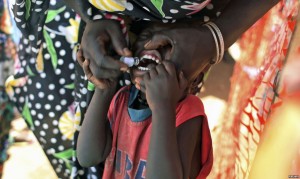 Cholera, an infection that is commonly found in central Africa, has affected thousands of millions of people every year, according to the World Health Organization (WHO). Cholera is an acute diarrheal disease that is caused by the strains of a bacterium called Vibrio cholerae. V. cholerae is a pathogen that colonizes the small intestine and causes symptoms such as watery diarrhea and vomiting. If left untreated, people will suffer from severe dehydration and leads to death within hours.
Cholera, an infection that is commonly found in central Africa, has affected thousands of millions of people every year, according to the World Health Organization (WHO). Cholera is an acute diarrheal disease that is caused by the strains of a bacterium called Vibrio cholerae. V. cholerae is a pathogen that colonizes the small intestine and causes symptoms such as watery diarrhea and vomiting. If left untreated, people will suffer from severe dehydration and leads to death within hours.
During March 2015, there were more than 10 students hospitalized after consuming cooked cassava tuber, which is a kind of African salad in Abakaliki, the capital of Ebonyi in Nigeria. They suffered from stooling right after the meal and went to hospital as the condition became worsen.
After investigation, they confirmed that this is a case of cholera, and the food was contaminated by flies, the director of Rural health, Ministry of Health, Dr. Christian Achi explained.

Cassava is a type of plant that is widely eaten as staple food in developing countries. That means many people eat it in a daily basis and if it is infected by V. cholerae, this can cause a huge outbreak of cholera in Africa. Therefore, cooking food thoroughly and maintain hygiene is very important in these areas to prevent any disease outbreak.
Many of us think that keeping our equipment clean and fully cook food are the essential things that we should do and are enough to prevent any disease. We never thought of flies to be the transmission route of bacteria. Flies carry bacteria from contaminated food to other non-contaminated food and cause people to be infected. Therefore, keeping the environment clean to avoid any insects from contacting food is also a key to preventing cholera.
According to the data provided by WHO, almost 45% of cholera cases were reported from Africa in 2013. Although the number of reported cases has already decreased compare to previous years, the reason why there are still more than ten thousand reported cases this year is probably due to flooding in Africa. This is because another way cholera contaminate food other than flies is through water. Flooding causes all the food soaked in dirty water and thus be contaminated by V. cholerae very easily. Also, due to all kinds of economical situations and limited water resources, people will drink water without processing such as boiling or filtering. As a result, cholera is widely spread in these areas where there is inadequate environmental management.
 The method people use to treat cholera is by oral rehydration salts (ORS), a treatment that is indicated by WHO. Severe diarrhea will leads to dehydration so ORS is a very effective and efficient way on rehydrating people. Anitibiotics are also used to shorten diarrhea duration. To control the outbreak of cholera due to weather such as raining season, they will introduce cholera vaccines to people. The following video shows the situations people are facing in Africa and how they are treating cholera using vaccination. In order to prevent cholera outbreak, improving sanitation and access of safe drinking water are the keys, which are also indicated on the video. We shall not neglect the importance of improving environmental conditions such as household hygiene, water filtration, development of water pipe system by treating disinfectants, etc. These strategies can upgrade their living conditions and minimize the chance of getting infected.
The method people use to treat cholera is by oral rehydration salts (ORS), a treatment that is indicated by WHO. Severe diarrhea will leads to dehydration so ORS is a very effective and efficient way on rehydrating people. Anitibiotics are also used to shorten diarrhea duration. To control the outbreak of cholera due to weather such as raining season, they will introduce cholera vaccines to people. The following video shows the situations people are facing in Africa and how they are treating cholera using vaccination. In order to prevent cholera outbreak, improving sanitation and access of safe drinking water are the keys, which are also indicated on the video. We shall not neglect the importance of improving environmental conditions such as household hygiene, water filtration, development of water pipe system by treating disinfectants, etc. These strategies can upgrade their living conditions and minimize the chance of getting infected.
Sources:
http://allafrica.com/stories/201503250132.html
http://www.who.int/mediacentre/factsheets/fs107/en/
http://www.who.int/gho/epidemic_diseases/cholera/en/
http://www.voanews.com/content/who-cholera-outbreaks-in-africa-middle-east/3018398.html
